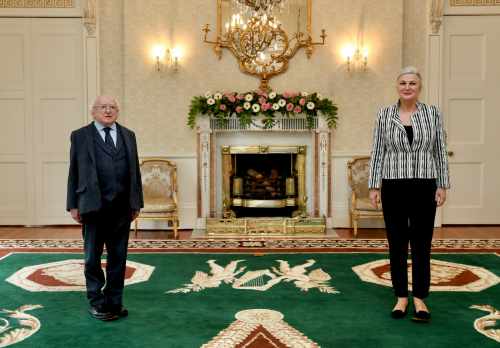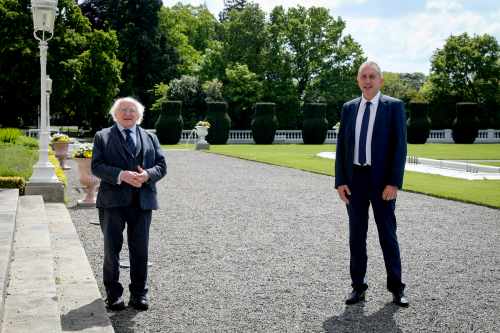Speech at the ECO-UNESCO Young Environmentalist Awards
26th May 2021
As an all-island environmental awards programme, ECO-UNESCO recognises and rewards young people who raise environmental awareness and improve our environment. The Young Environmentalist Awards do so much to encourage, inspire, educate, empower and support young people to act so that they may play their part in our greatest societal challenge, that of climate change.
As Patron of ECO-UNESCO, I am delighted to open this year’s Young Environmentalist Awards ceremony. The matters with which young people are now giving such a lead relate to the three issues of environment, justice and the future contribution of young people. What a source of encouragement for us all that young people are taking up the challenge with such enthusiasm. This is indeed a wonderful occasion that allows for the passion, energy and creativity of our young people to be given recognition.
For more than two decades, ECO-UNESCO has run the Young Environmentalist Awards, and I was indeed delighted to honour the work of young people to protect, conserve and enhance the environment through chosen local environmental projects that have the capacity to make a difference to their lives, and the lives of others, both locally and globally. The 50,000 young people who have taken part in the Young Environmentalist Awards since it began have, thus, helped to bring about positive, lasting change for our environment, reaching countless others with awareness-raising campaigns in schools and communities throughout Ireland. This work is so valuable in raising consciousness and building the support of activists.
The empowering of young people, by recognising and resourcing their own energy and efforts, to become more participative citizens – for example, by building awareness of environmental issues in the community and further afield, and by promoting and encouraging local actions and lifestyle changes to the environment – enables young people to engage in a form of active citizenship at its very finest.
ECO-UNESCO is of course a valuable partner of Gaisce, the President’s Award, and I wish to take this opportunity to send my regards to all those who are taking part in the Gaisce awards this year where, I am sure, we will see an extension of the projects for award into the environmental and rural biodiversity themes. I hope to see many of you in December at the next Gaisce awards ceremony which, I hope, this year will be an in-person event once again.
ECO-UNESCO plays its part in championing of the United Nations Sustainable Development Goals by raising awareness and promoting practical ways in which individuals, communities and organisations can help achieve the Goals, sharing inspirational ideas to help protect our planet in peril – this is such a valuable and necessary intervention.
The record number of entries this year is heartening at a time when the ecological crisis of biodiversity loss and climate change has been in such danger of falling off the radar as a result of the Covid-19 pandemic. This must be rectified, for all sakes, with the greatest urgency. It is true that there has been a temporary reduction in greenhouse gas emissions and air pollutants, one that has resulted from worldwide lockdowns. This should be seen as just that: a temporary aberration. It remains necessary that decarbonisation policies must now be put in place across all sectors of our economy, such as will enable a sustainable transition to a new, embedded paradigm of existence that is ecologically responsible, sustainable and socially just.
Climate change is now undeniable. If its impacts intensify over time, it is the children and young people of today who will face its worst effects. Climate change is now the greatest existential crisis we face as a global community, a result of human economic actions, taken most often by those with power in the economy, and the consequences falling most harshly on the most vulnerable, who were not the source.
We all can play our part, individually and collectively, within and across borders, in getting to a new place. In 2019, Ireland became the second country in the world to declare a climate and biodiversity emergency, recognising the critical nature and scale of the challenge facing us all. This is something of which we can all be proud. Now, together, we must make climate action a reality.
The Convention on the Rights of the Child states that every person under the age of 18 has the right to participate in the decision-making processes that impact on them. This is happening. Far from being passive victims, young people all over the world have begun making their voices heard on a scale never seen before. Whether through education, technology, science or law, young people far and wide are using their skills to speak up for environmental causes, ranging from climate change to pollution, ozone layer depletion, acid rain, natural resource depletion, overpopulation, waste disposal, deforestation and loss of biodiversity.
Climate disruption at the same time is a global issue, a national issue, and a local issue, one for which the window of opportunity to act is closing worryingly fast. We must take responsibility now for our role in this crisis, a crisis in which the origins can be traced back to the onset of the Anthropocene era at the start of the industrial revolution in the 1860s when an insatiable, unrestricted consumption of the Earth’s finite natural resources commenced.
In recent decades, we have moved to a crisis point as consumption has intensified, we have experienced an accelerated period of the Anthropocene, and the impacts on the Earth’s dwindling natural resources are now all too apparent: rapidly declining biodiversity and accelerating climate change impacts brought about by global warming. We now find ourselves at the precipice of a global ecological catastrophe.
The results of a bad model of connection between ecology, economy and society are obvious to all. Alarming shifts in climate are putting pressure on communities around the globe where ecosystems can no longer support populations, leading to a decline in, and ultimate lack of, resources for living and human flourishing. This, in turn, provides a basis for conflict, violence and forced migration and exile. The greatest and most immediate impacts are being borne by vulnerable peoples, such as those living in Small Island Developing States, whose very existence is at stake.
Failure to take collective action to prevent catastrophic climate change, failure to commit to the transfer of resources to assist communities to prepare for, and adapt to, changing climates, will see climate-related population flows taking place in a context of old and emerging conflicts that will undoubtedly be exploited by extremists.
Surely it is indefensible, on the grounds of basic human morality, that another 100 million people be doomed to extreme poverty by 2030 should we fail to honour the commitment to tackle climate change?
Development can take place in a sustainable manner to ensure that it meets the needs of the present without compromising the ability of future generations to meet their own needs. This is the basis of inter-generational equity. There are powerful, often unaccountable, sources of resistance to what is necessary to be done. Here is where the energy of citizens, young and old, is the resource that can counter such opposition.
All of us – individuals, families, communities and professions alike – must take ownership of the commitment to tackle climate change if we are to succeed in our low-carbon transition for our economy and society. We, all of us as citizens, have a moral obligation to play our part in this great societal transformation, invoking our shared humanity to reconnect our lives through a balanced relationship between ecology, ethics, economy, culture and a lived experience of fulfilment.
Our Government in its published policy has said that, here in Ireland, we need to continue to insulate our homes, upgrade our heating systems to renewable sources, switch to electric vehicles, build more public transport, plant more trees, farm more sustainably, and, overall, wean ourselves off our fossil fuel-dependent lifestyles. We also need to put in place the critical infrastructure that will enable the country to adapt and become resilient to climate change that is already occurring. We all must become involved in ensuring that these aims become a reality – and without delay.
Iarraim oraibh go léir atá ag glacadh páirt sa ghradam seo, gníomhú le chéile. Chun na cuspoir seo a bhaint amach.
[I urge all those taking part in these awards to work together, to achieve these objectives.]
We must act now. Putting our actions off until tomorrow merely intensifies and perpetuates the injustice of environmental degradation, particularly climate change and biodiversity loss. Our present generations run the risk of correctly being regarded by future survivors of our planet as having been in collusion with the destruction of the lives and life-worlds of some of the most vulnerable peoples that make up our human family and the biodiversity on which our very planetary life depends.
May I thank you for all your efforts.
Guím gach rath ar gach duine atá ag glacadh páirte sna Young Environmentalist Awards. Gabhaim buíochas libh as ucht bhur gcuid iarrachtaí spreagúla agus inspioráideacha.
[May I wish all those taking part in the Young Environmentalist Awards good luck, and thank you for your uplifting and inspiring endeavours.]
Beir beannacht.


